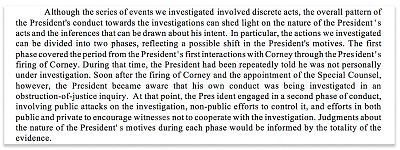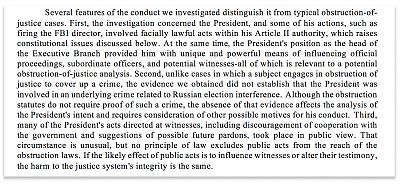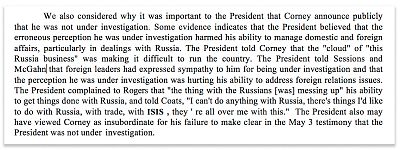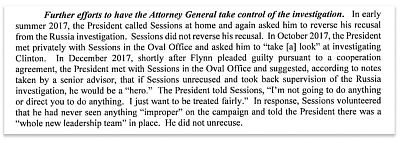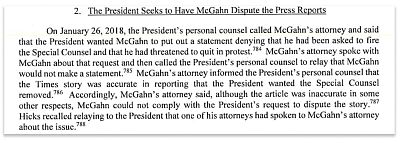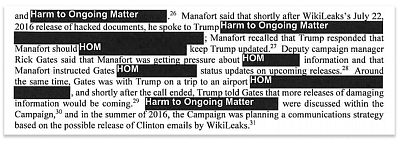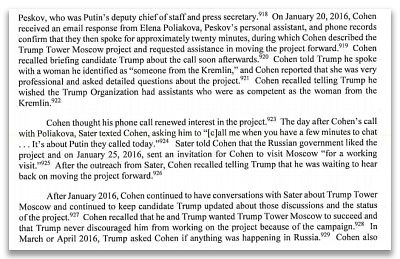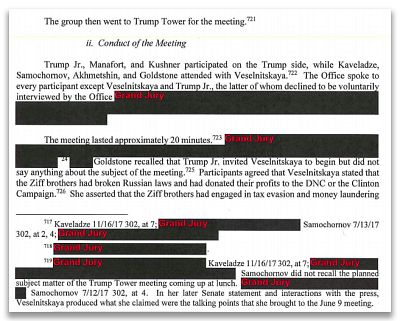Robert Mueller repeatedly answered questions by referring to his report during his testimony. Here's what those sections of the report say.
Robert Mueller repeatedly answered questions by referring to his report during his testimony Wednesday. We've highlighted some of those questions and the parts of his report the former special counsel was referring to.
 ADVERTISEMENT
ADVERTISEMENT
 ADVERTISEMENT
ADVERTISEMENT
1. Jerry Nadler, D-N.Y.: Now, am I correct that on page 7 of Volume 2 of your report, you wrote, quote: "The president became aware that his own conduct was being investigated in an obstruction of justice inquiry. At that point, the president engaged in a second phase of conduct, involving public attacks on the investigation, nonpublic efforts to control it, and efforts in both public and private to encourage witnesses not to cooperate with the investigation," close quote.
So President Trump's efforts to exert undue influence over your investigation intensified after the president became aware that he personally was being investigated?
Robert Mueller: I stick with the language that you have in front of you, which comes from page 7, Volume 2.
2. Doug Collins, R-Ga.: Is it true the evidence gathered during your investigation did not establish that the president was involved in the underlying crime related to Russian election interference as stated in Volume 1, page 7?
Robert Mueller: We found insufficient evidence of the president's culpability.
Collins: So that would be a yes.
Mueller: Pardon?
Collins: That would be a yes.
Mueller: Yes.
Collins: Thank you.
Isn't it true the evidence did not establish that the president or those close to him were involved in the charged (ph) Russian computer hacking or active measure conspiracies or that the president otherwise had unlawful relationships with any Russian official, Volume 2, page 76? Correct?
Mueller: I will leave the answer to our report.
3. Zoe Lofgren, D-Calif.: Months before that meeting, Manafort had caused internal data to be shared with Kilimnik, and the sharing continued for a (inaudible) period of time after their August meeting. Isn't that correct?
Robert Mueller: That's correct.
Lofgren: In fact, your investigation found that Manafort briefed Kilimnik on the state of the Trump campaign and Manafort's plan to win the election and that briefing encompassed the campaign's messaging, its internal polling data. It also included discussion of battleground states, which Manafort identified as Michigan, Wisconsin, Pennsylvania and Minnesota. Isn't that correct?
Mueller: That's correct.
Lofgren: Did your investigation determine who requested the polling data to be shared with Kilimnik?
Mueller: Well, I -- I would direct you to the report. That's what we have in the report with regard to that particular issue.
4. Steve Cohen, D-Tenn.: Despite knowing that Attorney General Sessions was supposed to be in — was not supposed to be involved in the investigation, the president still tried to get the attorney general to un-recuse himself after you were appointed special counsel. Is that correct?
Robert Mueller: Yes.
Cohen: In fact, your investigation found that at some point after your appointment, quote, "the president called Sessions at his home and asked if he would un-recuse himself." Is that not true?
Mueller: It's true.
Cohen: Now, that wasn't the first time the president had asked Sessions to un-recuse himself, was it?
Mueller: I know there were at least two occasions.
Cohen: And one of them was with Flynn, and one of them was when Sessions and McGahn flew to Mar-a-Lago to meet with the president. Sessions recalled that the president pulled him aside to speak alone and suggested he should do this un-recusal act, correct?
Mueller: Correct.
Cohen: And then when Michael Flynn, a few days after Flynn entered a guilty plea for lying to federal agents and indicated his intent to cooperate with that investigation, Trump asked to speak to Sessions alone again in the Oval Office, and again asked Sessions to un-recuse himself. True?
Mueller: I'd refer you to the report for that.
5. Louie Gohmert, R-Texas: Director Mueller, I'd like to get back to your findings covering June of 2017. There was a bombshell article that reported that the president of the United States was personally under investigation for obstruction of justice.
And you said in your report on page 90 of Volume 2, and I quote, "news of the obstruction investigation prompted the President to call McGahn and seek to have the Special Counsel removed," close quote. And then in your report you wrote about multiple calls from the president to White House counsel Don McGahn.
And regarding the second call, you wrote, and I quote, "McGahn recalled that the President was more direct, saying something like call Rod, tell Rod that Mueller has conflicts and can't be Special -- can't be the Special Counsel. McGahn recalled the President telling him Mueller has to go and call me back when you do it."
Director Mueller, did McGahn understand what the president was ordering him to do?
Robert Mueller: I direct you to the — what we've written in the report in terms of characterizing his feelings.
Gohmert: And in the report it says, quote, "McGahn understood the President to be saying that the Special Counsel had to be removed." You also said on page 86 that, quote, "McGahn considered the President's request to be an inflection point and he wanted to hit the brakes and he felt trapped and McGahn decided he had to resign."
McGahn took action to prepare to resign, isn't that correct?
Mueller: I direct you again to the report.
6. Karen Bass, D-Calif.: But your investigation actually found substantial evidence that McGahn was ordered by the president to fire you. Correct?
Robert Mueller: Yes.
Bass: Did the president's personal lawyer do something the following day in responses to that news report?
Mueller: I'd refer you to the coverage of this in the report.
7. Jamie Raskin, D-Md.: Now, one of these witnesses was Michael Cohen, the president's personal lawyer, who ultimately pleaded guilty to campaign violations based on hush money payments to — to — when the president knew, and also to lying Congress — lying to Congress about the hope (ph) for $1 billion Trump tower deal. After the FBI searched Cohen's home, the president called him up personally, he said to check in, and told him to, quote, "hang in there and stay strong." Is that right? Do you remember finding that?
Robert Mueller: It's in the report as stated. Yes, it is right.
8. Mary Gay Scanlon, D-Penn.: OK. Let's look at an event described on page 18 of Volume 2 of your report. Now according — and we're going to put it up in a slide, I think. According to Deputy Campaign Manager Rick Gates, in the summer of 2016, he and Candidate Trump were on the way to the airport shortly after WikiLeaks released its first set of stolen e-mails. And Gates told your investigators that Candidate Trump was on a phone call, and when the call ended, Trump told Gates that "more releases of damaging information would be coming, end quote. Do you recall that from the report?
Robert Mueller: If it's in the report, I support it.
Scanlon: OK, and that's on page 18 of Volume 2. Now, on page 77 of Volume 2, your report also stated, quote, "In addition some witnesses said that Trump privately sought information about future WikiLeaks releases," end quote. Is that correct?
Mueller: Correct.
Scanlon: Now, in Appendix C, where the president did answer some written questions, he said, quote, "I do not recall discussing WikiLeaks with him, nor do I recall being aware of Mr. Stone having discussed WikiLeaks with individuals associated with my campaign," end quote. Is that correct?
Mueller: If it's from the report, it is correct.
9. Joaquin Castro, D-Texas: Thank you. The party line in this case was that the deal ended in January 2016, in other words they were saying that the deal ended in January 2016 before the Republican primaries. In truth though, the deal extended to June 2016, when Donald Trump was already the presumptive Republican nominee, is that correct?
Robert Mueller: That is correct.
Castro: The party line was also that Cohen discussed the deal with Trump only three times, when in truth they discussed it multiple times, is that right?
Mueller: Also true in the basis for — and part of the basis for that plea that he entered (ph) for lying to this entity.
Castro: Thank you — and thank you for prosecuting that. The party line was also that Cohen and Trump never discussed traveling to Russia during the campaign when in truth they did discuss it, is that right?
Mueller: That's accurate.
Castro: And the party line was that Cohen never received a response from the Kremlin to his inquiries about the Trump Tower Moscow deal. In fact, Cohen not only received a response from the Kremlin to his e-mail, but also had a lengthy conversation with a Kremlin representative who had a detailed understanding of the project, is that right?
Mueller: If it's in the — if it's in the report that is accurate representation of that piece of the report.
10. Devin Nunes, R-Calif.: And I know you don't want to ask — answer any dossier questions, so I'm not going there, but your report mentions Natalia Veselnitskaya 65 times. She meets in the Trump Tower. It's this infamous Trump Tower meeting that's in your report. You've heard many of the Democrats refer to it today. The meeting was shorter than 20 minutes, I believe. Is that correct?
Robert Mueller: I think what we have in our report reflects it was about that length.











